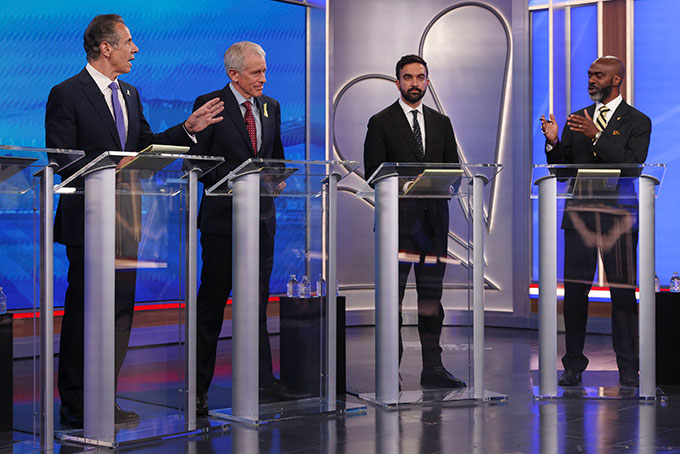Last night, nine Democrats vying for their party’s nomination for mayor of New York debated for two hours on live television—much of it spent speaking over one another. Despite sparring over records and contentious issues like crime, housing affordability, and anti-Semitism, the debate is unlikely to shift many voters’ views. No longshot stood out enough to signal the rise of a new contender.
With early voting set to begin in nine days, the Democratic primary is likely to focus on familiar figures: frontrunning former governor Andrew Cuomo and rising young socialist Zohran Mamdani. The debate marked the first time that Cuomo—who has largely avoided multicandidate events—faced his rivals directly. He didn’t have to wait long before his opponents began piling on about his handling of a report about nursing home deaths during Covid, with Mamdani saying that he doesn’t “think it’s unfair” that Donald Trump’s Justice Department is investigating the former governor.
Finally, a reason to check your email.
Sign up for our free newsletter today.
While the other candidates focused on taking down Cuomo, the former governor had a more complex assignment. He needed to keep his composure in this first public encounter with his primary opponents, convince voters of his competence, and attempt to deflate Mamdani’s rising poll numbers. He delivered an able performance, with some memorable lines, such as his claim that Mamdani had “actually produced nothing” in his “27 minutes” in government. (In more than four years in the legislature, Mamdani has seen just three of his bills become law.)
But Cuomo missed some opportunities to connect with voters open to giving him a second chance. In a lightning round near the end of the night, the moderators asked candidates to share how much they pay for housing. Cuomo responded gruffly: “Seventy-eight hundred.” Former comptroller Scott Stringer, by contrast, quipped that he’s getting ripped off for his $6,400 unit.
President Trump emerged as the biggest villain of the evening, with the candidates vowing to oppose Washington in various ways. Mamdani called himself “Donald Trump’s worst nightmare, as a progressive, Muslim immigrant who actually fights for the things I believe in.” Cuomo shot back that Trump would go through the inexperienced Mamdani “like a hot knife through butter.”
By contrast, incumbent mayor Eric Adams received little attention. The mayor wasn’t on stage last night, having withdrawn from the primary to run on an independent ballot line in the general election. The candidates also had little to say about Governor Kathy Hochul or state legislative leaders.
Candidates spent some of the night retreating from their past statements and positions. Comptroller Brad Lander, who as a councilmember supported reducing the police budget in 2020, publicly praised tough-on-crime Police Commissioner Jessica Tisch and promised to retain Tisch in that job. He even credited the Manhattan Institute with informing his policy on drug-treatment courts.
When the candidates were asked about their biggest political regrets, Cuomo refused to answer directly. He pointed to the state of the Democratic Party, which had enabled Trump to reclaim the presidency, and to Mamdani as emblematic of what’s gone wrong. That gave City Council Speaker Adrienne Adams her best moment of the evening, interjecting to ask how Trump could be Cuomo’s biggest regret, not the governor’s having purportedly cut Medicaid, health care, and child care. (Medicaid spending grew substantially during his tenure as governor.) A moderator then asked Cuomo about investigations into his creating a “toxic work environment for women” while governor. He denied the premise, reminding viewers that he called the report “political” and “false.” If he had caused offense, he said, it was unintentional—but for that, he apologized.

Throughout the evening, the candidates resurfaced opponents’ decades-old comments. Assemblymember Michael Blake dug up Cuomo’s use of the term “shuck and jive” during the 2008 Democratic presidential primary, when the then-attorney general of New York supported Hillary Clinton. In effect, this was an attempt to peel away Cuomo’s strong support among black voters with a charge of racial insensitivity. Not to be outdone, Cuomo hit Mamdani for tweeting in 2013 that President Obama was a liar and “pretty damn evil.”
Mamdani’s most contentious flare-up, however, came near the debate’s end, when he refused to say outright that Israel had the right to exist as a Jewish state. Cuomo, who has positioned himself as a leader against anti-Semitism, capitalized on the omission and reiterated that the Democratic Socialist is unwilling to travel to Israel as mayor.
The debate stage was overcrowded, with some candidates clearly out of their depth. Blake and State Senator Jessica Ramos have failed to qualify for next week’s debate—likely prompting Blake to seize the spotlight by repeatedly disrupting the discussion, ultimately becoming a distraction. Ramos used her long-shot moment to describe shoplifting as a form of “kleptomania” best addressed through treatment courts. Ranked-choice voting—often praised for giving lower-tier candidates more influence by letting their supporters rank viable alternatives—may have indirectly encouraged the evening’s shouting matches.
More viable candidates, like State Senator Zellnor Myrie, didn’t interrupt or tussle with Cuomo as much—but also didn’t stand out. That’s unfortunate, as the sincere and policy-focused Myrie is essentially testing the political appetite for a liberal abundance agenda. He’s calling for 1 million new or preserved housing units and for keeping public schools open until 6 p.m. Stringer also mostly took a back seat, though he notably criticized Cuomo for signing bail reform into law. When asked directly about that policy, Cuomo dodged and instead attacked Lander.
The most out-of-place candidate was former hedge fund manager Whitney Tilson, who nonetheless offered the soundest policies of the evening. Rather than stick to Democratic shibboleths like “affordable housing,” Tilson said that he would “unleash the private sector by building a lot more housing.” He was alone in supporting charter schools and advocating for “substantial changes” to the state’s bail and discovery reform, “such that prosecutors can actually punish repeat offenders.” Despite being a lifelong Democrat, Tilson would likely fare better in a nonpartisan primary (which might well come to the city).
Tellingly, no candidate named a second-choice preference—an omission that works to Cuomo’s advantage. Progressives would stand a far better chance of unseating the frontrunner if they coordinated their supporters’ ballots to include the other left-wing candidates. But time is running out. If they fail to act, many low-information primary voters are likely to default to Cuomo, whose name recognition is unmatched.
Most candidates met their objectives, but the race remains largely unchanged. With his defenses battered but intact, Cuomo enters next week’s final debate still the man to beat.
Top Photo by Yuki Iwamura-Pool/Getty Images
City Journal is a publication of the Manhattan Institute for Policy Research (MI), a leading free-market think tank. Are you interested in supporting the magazine? As a 501(c)(3) nonprofit, donations in support of MI and City Journal are fully tax-deductible as provided by law (EIN #13-2912529).
Source link

















